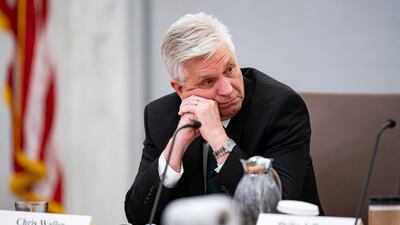Tariffs that could be imposed by US president-elect Donald Trump are unlikely to have a material effect on the Federal Reserve's interest rate decisions, a senior central bank official said on Wednesday.
Mr Trump has maintained his position of enforcing universal tariffs of 10 to 20 per cent, which he made during his campaign, saying on Monday that he would not narrow his plans. The proposal has received criticism from most economists who say such a policy would result in higher consumer prices and a reduction of trade flows.
Fed governor Christopher Waller, an influential member of the rate-setting Federal Open Market Committee, said that while such proposals raise the possibility that a “new source of upwards pressure on inflation could emerge”, he does not believe it will have a material impact on the Fed's rate cut plans.
“If, as I expect, tariffs do not have a significant or persistent effect on inflation, they are unlikely to affect my view of appropriate monetary policy,” he said at an event for the Organisation for Economic Co-operation and Development in Paris.
During the question-and-answer segment of the event, Mr Waller said he does not believe most "draconian" policies would be enacted. He did not mention Mr Trump by name in his speech.
The Fed is considering how to proceed with interest rate cuts after economic data in recent months showed that progress in taming inflation has stalled. It reduced its benchmark interest rate last year by 100 basis points to its current range of 4.25 to 4.50.
Projections released by the Fed last month showed an expectation among officials of two rate cuts this year, which is a downgrade from their previous forecast. Some Fed officials considered Mr Trump's policies when they made their forecasts. The projections also showed a wide range of forecasts from no rate cuts this year to five, underscoring the lack of consensus among US central bankers.
The Fed is scheduled to release minutes from its December meeting on Wednesday, which could provide more clues on officials' thinking heading into this year.
Minutes from the Fed's December 17-18 meeting released later on Wednesday showed that the president-elect's tariffs were also weighing on members' thinking about future policy.
"A few participants remarked that, in the period ahead, it might be difficult to distinguish more persistent influences on inflation from potentially temporary ones, such as those stemming from changes in trade policy that could lead to shifts in the level of prices," the minutes read.
Mr Waller said he will continue to support rate cuts this year if inflation continues to move down as he expects: “The pace of those cuts will depend on how much progress we make on inflation while keeping the labour market from weakening.
“As always, the extent of further easing will depend on what the data tell us about progress towards 2 per cent inflation, but my bottom-line message is that I believe more cuts will be appropriate.”
Fed minutes showed that most officials believe the central bank is at or near the point "at which it would be appropriate to slow the pace of policy easing", a sentiment echoed by Fed chairman Jerome Powell and other officials since the most recent policy reduction. Traders believe there is an almost nil per cent chance the Fed will cut rates when it meets again this month, the CME Group's FedWatch tool showed.
Officials also suggested changes in trade and immigration policies could prolong the process in taming inflation, according to the minutes.
Mr Waller, who holds a permanent vote on the FOMC during his term, said he believes inflation will continue to fall this year while the economy remains on “solid footing”.
He pointed to several factors, including the six-month trend in core inflation, a better-than-expected November reading and prices that are estimated rather than observed. He also said higher inflation readings in the early part of last year will begin to drop out of inflation numbers this month.
“This should result in a significant step-down in the 12-month inflation numbers through March,” he said.
The US Labour Department is scheduled to release new economic data on Friday that should offer a clearer picture of the jobs market. A Dow Jones survey of economists anticipates employers added 155,000 jobs last month, which would be a sharp decline from November's gain of 227,000.


